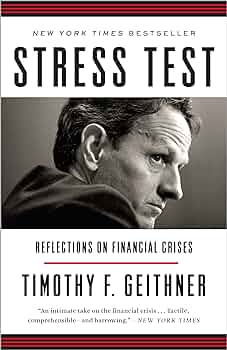In this gripping and lucidly written memoir, Geithner takes the reader on a journey through the complex events that led to the 2008 financial crisis, his role as President of the Federal Reserve Bank of New York, and later as Secretary of the Treasury in the Obama administration. His ability to explain intricate financial concepts in an accessible manner makes this book an excellent resource for those with varying levels of expertise in economics and finance.
One of the book's most compelling aspects is Geithner's candor. He openly discusses the dilemmas and hard choices he and his colleagues faced, often making it clear that they were navigating uncharted territory. This transparency makes it abundantly clear that the decisions made during the crisis were not taken lightly and that they carried enormous consequences.
"Stress Test" also offers a fascinating look into the personalities and dynamics of the key figures during the crisis, from Ben Bernanke and Hank Paulson to President Barack Obama. Geithner's personal reflections and anecdotes add depth and a human touch to the narrative, highlighting the enormous pressures and challenges faced by those tasked with preventing a complete economic collapse.
While the book primarily focuses on the financial crisis, it also delves into broader policy issues, including healthcare reform, the challenges of working in the political realm, and the complexities of dealing with the media and public perception. These insights provide a well-rounded view of the modern challenges of economic governance and crisis management.
Some readers may argue that the book could offer a more critical self-assessment, as Geithner, at times, defends his actions or the actions of his colleagues in a way that may seem self-serving. However, this book primarily serves as a first-person account of the crisis and its response, not a detached academic analysis.
In conclusion, "Stress Test: Reflections on Financial Crises" is a remarkable and invaluable contribution to the understanding of the 2008 financial crisis and the subsequent efforts to stabilize the global economy. Geithner's writing is engaging, his insights are profound, and his storytelling is compelling. This book is a must-read for anyone interested in the inner workings of financial crises, economic policy, and the challenges of leadership in times of extreme stress. It provides a rare glimpse into the decision-making process at the highest levels of government during a pivotal moment in history.



